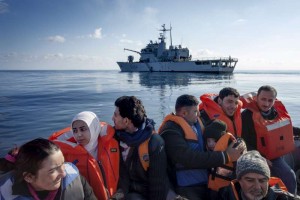Europe’s poisonous migration debate
One of the most toxic issues in European politics – the debate around immigration – plunged even lower this week with a standoff between leaders over a controversial binding quota system aimed at sharing the burden of accommodating the tsunami of refugees and asylum seekers entering the continent.
On the one hand German Chancellor Angela Merkel and the EU want a quota system obliging EU countries to share the burden of settling refugees but they are being opposed by some European leaders, most notable Britain’s newly re-elected Prime Minister David Cameron.
The EU commission proposal for a quota is anathema to many of the national leaders although it has been welcomed as sensible and long overdue by immigration professionals and agencies.
The quota system would work through a “redistribution key” which would allocate numbers based on GDP, population, unemployment and previous rates of taking in asylum seekers.
Emergency mechanisms would be invoked by the end of the month to oblige Britain and the other 27 member states to make a “fair and balanced contribution” to taking in “persons in clear need of international protection”.
A longer-term plan for “a mandatory and automatically-triggered relocation system” would, result in the UK dealing with at least twice the present 30,000 cases each year.
It was the crisis in the Mediterranean with thousands of people drowning on asylum seeker boats – almost 2000 this year already – that forced the EU’s move.
After criticism that it has been slow to react to this evolving human tragedy, the EU has suddenly become proactive.
Two big initiatives are being proposed – the attempt to introduce a quota system for spreading refugees across Europe and the quest for a UN mandate allowing European states to launch military action against the migrant trafficking networks.
Militarily and logistically, the use of force will be difficult. But politically, the military option is the most straight-forward. All 28 governments are said in Brussels to be supportive of the plans to hit the smugglers and blow up their vessels.
Immigrant quotas are much more difficult. There is no chance of consensus emerging quickly.
The Mediterranean frontline states of Italy, Greece, and Malta are in favour of the refugee-sharing proposals because they are shouldering the burden of accepting new arrivals.
Germany, leading the campaign, along with Sweden and Austria are also in favour, for the straightforward reason that they take in much more asylum seekers than the others and a quota system would bring them a net reduction.
Cameron, confident and revitalised, is trying to get the rest of the EU to agree to curbs on migration within the union and will not agree to a larger British quota, especially if it is set by Brussels.
Denmark, Holland and France are also wary of a quota system given the electoral gains being made by ultra-nationalist right wing groups in each if these countries.
And the eastern European members of the EU, who take in small numbers of asylum seekers, do not want to change their habits.
For domestic political reasons and because he is bleeding support to the neo-fascist extreme right, Hungary’s President Viktor Orbán is positioning himself as the EU’s anti-immigration hardliner.
For the UN’s refugee agency and other professionals in the field, such as the International Organisation for Migration, one of the most sensible suggestions from the commission in Brussels is that legal ways have to be made available for entering the EU for migrants judged clearly to be imperilled and needing protection.
This has incurred the wrath of some national leaders with UK Home Secretary Theresa May saying at meetings of EU interior ministers that this is the wrong way to tackle the emergency and that “such an approach would only… encourage more people to put their lives at risk”.
The commission’s blueprint is uncharacteristically radical, going much further than had been expected. EU Commission President Jean-Claude Juncker has perhaps been emboldened by the decision of the German chancellor, Angela Merkel, to come out publicly for a quota system.
With Germany expecting 450,000 refugee applications this year — more than double last year’s total — Merkel wants other countries to accommodate a greater share of the desperate masses arriving from Syria, Libya and the Balkans, and from struggling African nations.
EU states granted protection status to 185,000 asylum seekers last year, nearly 50 per cent more than with 2013. Since 2008, more than 750,000 asylum seekers were granted protection status in the EU.
But the attempt to launch a more coherent and equitable Europe-wide immigration regime, however problematic it turns out to be, is also a measure of how the tragedies in the Mediterranean are shifting policymaking in Europe.
Laurie Nowell
AMES Senior Journalist













